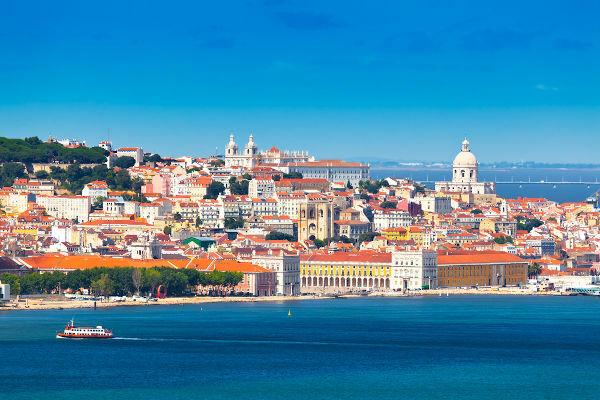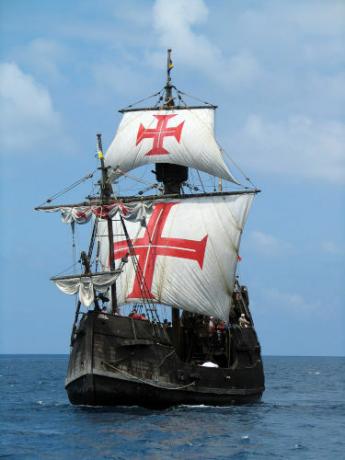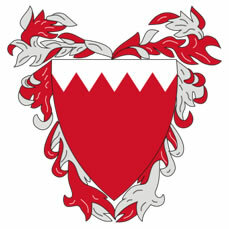At Big onesNavigations were oceanic navigations carried out throughout the 15th century that allowed the exploration of the Atlantic Ocean. They were possible thanks to the accumulation of nautical knowledge and the arrival of new technologies that facilitated navigation. The country that had the necessary conditions to start the Grand Navigations was Portugal.
Throughout the 15th century, Portugal organized numerous expeditions in the Atlantic Ocean, starting from the conquest of Ceuta, in 1415. The Portuguese arrived at a number of islands in the Atlantic, found an alternative route to India, and arrived in Brazil at the end of the 15th century. The Spaniards, in turn, arrived in america first, in 1492.
read more: Extraction of pau-brasil - the first economic activity implemented by the Portuguese in Brazil
Portuguese pioneering

The exploration of the Atlantic Ocean has always intrigued Europeans, and since the
medieval period, some advances have allowed it to be possible. One of the first European peoples to embark on an oceanic exploration were the nordic, which, at the end of the eighth century, reached England, and, from there, reached Iceland, in the ninth century, and the North America, at the end of the 10th century.The accumulation of knowledgenautical and the development of newtechnologies made it possible for the Grandes Navegações to begin in the 15th century, and the Portuguese are considered the pioneers in this process. This happened because Portugal met a series of conditions that allowed the country to launch itself in the navigation and exploration of the Atlantic Ocean.
Portugal gathered conditionspolitics, economical, geographical, and even Portuguese society embraced maritime exploration. In the long term, we know that this made Portugal reach places hitherto unknown to Europeans in general. New paths were discovered and new trades were opened for them.
However, why was Portugal the pioneer country in Grandes Navegações? The factors are varied and we can start with the stabilizationpolitics. Since the end of the 14th century, when the Avis Revolution, Portugal enjoyed a consolidated monarchy and a stable political power in the hands of the Avis dynasty. Other regions of Europe, such as Spain, were experiencing major power conflicts.
Furthermore, Portugal enjoyed unificationterritorial, since the last portion of Portuguese territory was annexed to the kingdom in the mid-13th century, when the Algarve region was reconquered and the Moors were expelled from it. Again in comparison with Spain, the kingdom of Castile engaged in conflicts with the Moors during the 15th century, and the kingdom of Aragon engaged in conflicts with France over territories in the same century.
At questioneconomical, Portugal was an important center of commerce, and its main city, Lisbon, since the 13th century, had already maintained long-distance commercial contacts, according to historian Boris Fausto|1|. Lisbon maintained contact with Arab markets, and local trade had prospered significantly through financing provided by the Genoese.
The Arab market, in turn, had two important items for the Portuguese: gold and spices. The consumption of spices was introduced in Europe after the Crusades, and they were widely used in food preservation and in the production of perfumes and medicines. They were valuable goods and yielded a very high profit. Closing the route that passed through Constantinople in 1453, made access to this merchandise more complicated.
Another factor that we must not forget is the localizationgeographic from Portugal. This country has its entire coastline facing the Atlantic Ocean. In addition, Portugal is very close to the ocean currents of the Atlantic, which facilitated and encouraged navigation in this ocean.
Finally, as Boris Fausto puts it, the entire Portuguese society encouraged Atlantic navigation, which made it a great projectnational|2|. The historian summarizes that Atlantic navigation pleased merchants because it brought them good business prospects; for the Crown, it represented a chance to strengthen the coffers; for the nobility and the Church, it brought the possibility of Christianizing pagans and gaining influence and wealth; and for the people in general, it brought a chance of a better life|3|.
Accessalso: Hans Staden, the German who came to Brazil in the 15th century
Portuguese navigation feats

Historians consider that the starting point of the Portuguese maritime expansion was the conquest of Ceuta, in North Africa, in 1415. This happened because the Portuguese wanted to have access to Arab gold and they wanted to find the mythical kingdom of João Preste, to join him in the fight against the Muslims.
The oceanic exploration carried out by the Portuguese concentrated on exploring the coast of the African continent, and, little by little, it reached places previously unknown to them. In chronological order, the Portuguese arrived at wood in 1420, the Azores in 1427, at Islandsfrom Cape Verde in 1460 and the They areThomas in 1471.
One of the great achievements of the exploration of the African coast was the contour of Cape Bojador, in 1434. This cape is located in the territory of present-day Western Sahara and, in the 15th century, was a target location for many legends and myths due to the large number of Portuguese vessels that had disappeared in him.
This was because Cape Bojador has a series of reefs, very sharp, and in certain parts of the cape the water depth is very small. These two factors made navigation in that place very dangerous. The person responsible for bypassing this cable was the navigator GilEanes.
In 1441, a new vessel was developed by the Portuguese: the caravel. It facilitated maritime navigation, especially in situations where the wind was against the vessel. This vessel used sails to navigate and mixed square candles with lateen candles (triangular). It was the main means of maritime transport for the Portuguese until the 17th century.
In that same year, it was also recorded that the purchase of enslaved Africans by the Portuguese became very common, and historian Marianne Mahn-Lot brings a record made by a 15th-century Portuguese chronicler, called Gomes Eanes de Zurara, that justified the slavery of blacks as a consequence of God's curse on Ham, one of Noah's sons. In this logic, blacks would be descendants of Cam and, therefore, cursed|4|.
![In the reign of d. João II, the Cape of Good Hope was surpassed by the navigator Bartolomeu Dias in 1488.[1]](/f/0beeabc18101eb1ab6e9c8d15a565d26.jpg)
In 1481, d. John II was crowned king of Portugal and the Atlantic exploration gained new incentive, with the focus still on the exploration of the African coast. The objective was to find a passage that would allow the Portuguese to reach the spice trade in India. As they explored the African coast, new Portuguese factories were established. In addition to the enslaved, the Portuguese bought ivory and pepper|5|.
With the exploration of the Atlantic, the Portuguese were also able to start the economic exploitation of the places they arrived. In Madeira, they performed the planting wheat and of the sugar cane. In São Tomé, for example, they established the planting of sugar cane, and the place became an entrepot for enslaved people who were bought to be sent to Brazil.
Another highlight of Portuguese navigations was the crossing the Cape of Good Hope, in the extreme south of the African continent, carried out by the navigator BartholomewDays in 1488. This cape was also known as Cabo das Tormentas because of its rough waters, and the passage through it allowed the discovery of a new route to India, made by the navigator Vasco da Gama in 1498.

Vasco da Gama returned to Portugal from India in July 1499, and, months later, a new expedition was organized. This was the expedition of Pedro Alvares Cabral, which had India as its final destination, but which also had the mission of verifying the possibilities of the Portuguese in the west after the signing of the Treaty of Tordesillas, in 1494.
spanish navigations
As mentioned in this article, Portugal had conditions that other countries in Europe, such as Spain, did not have. The Portuguese were the great pioneers of the Great Navigations, but it was the Spanish who sent the first expedition to America in this context.
First, during the second half of the 15th century, Spain (which corresponded to the Kingdoms of Castile and Aragon) faced conflictsdynastics, conflicts against the French and, above all, against the moors, established in the kingdom of Granada, in the south of the Iberian Peninsula. Only after the Spaniards conqueredGrenade, in 1492, they embarked on Atlantic navigation.
The first great Spanish expedition was led by the Genoese Christopher Columbus, who convinced the Spanish kings to finance his trip to the west. In October 1492, Columbus' expedition, which consisted of three vessels, arrived in Guanahani, an island that is part of the Bahamas.
Accessalso: Discover Pero Lopes de Sousa's navigation diary
Consequences
The Great Navigations were a very important event in European history and contributed to radically change the world. Among the consequences of Great Navigations are:
- The establishment of the slave trade;
- The beginning of colonization;
- The establishment of economic practices of the mercantilism;
- The transformation of Portugal and Spain into two great overseas empires.
Grades
|1| FAUSTO, Boris. concise history of Brazil. São Paulo: Edusp, 2018. P. 9.
|2| Idem, p. 11.
|3| Idem, p. 10-11.
|4| MAHN-LOT, Marianne. the discovery of america. São Paulo: Perspective, 1984. P. 27.
|5| FAUSTO, Boris. concise history of Brazil. São Paulo: Edusp, 2018. P. 13.
Image credits
[1] Georgios Kollides and Shutterstock
By Daniel Neves
History teacher
Source: Brazil School - https://brasilescola.uol.com.br/historiab/grandes-navegacoes.htm

